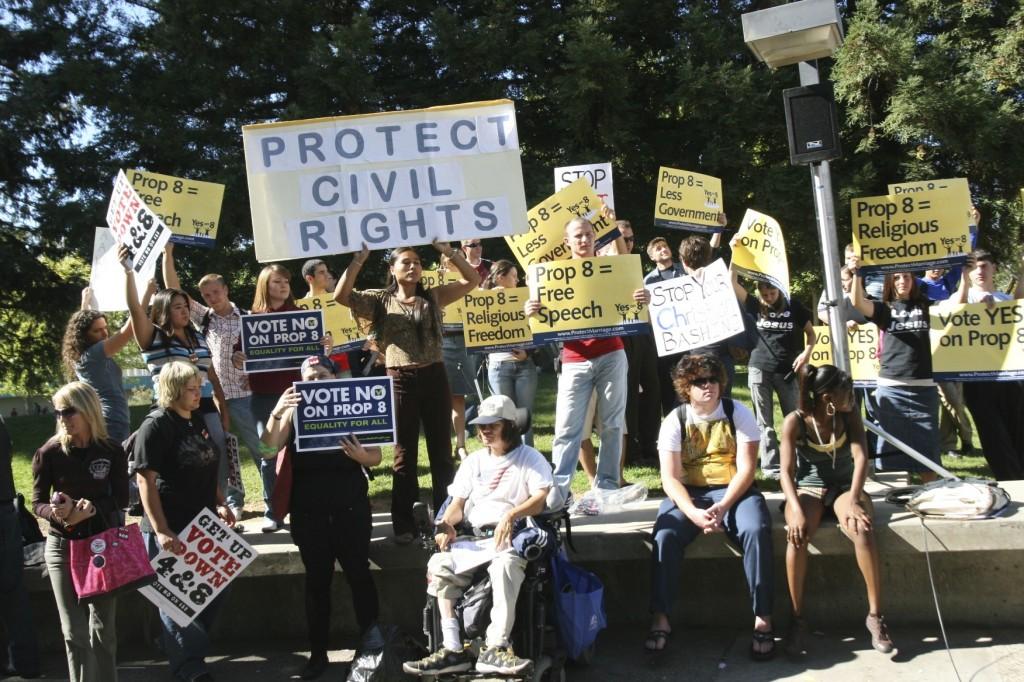The California court has spoken: marriage is no longer defined as a union between one man and one woman. Proposition 8, a much debated initiative which was voted into law in 2008, violated California’s Equal Protection Clause by singling out one group of people and denying them the right to marriage; therefore the law is unconstitutional.
In October 2008, American River College became the first publicly funded school to endorse a state ballot measure; one that for many figured a state of intolerance. The Associated Student Body council voted 8-3 to endorse Prop 8. The decision brought national media coverage as students of ARC came together and refused to let eight people speak for the entire school.
This endorsement became so unpopular with ARC, students petitioned to recall the eight ASB members from office. The petition required 200 signatures, but more than 450 signatures were gathered in response to the endorsement. Once the petitioned had been signed, 3,400 students turned out to vote in the recall of the eight ASB council members.
Everyone is entitled to their own opinion and their right to freedom of speech under the First Amendment, but constitutionally gay marriage cannot be deemed illegal. There cannot be a law that limits one group of people (homosexual couples) from marriage, when heterosexual couples can be married.
Civil unions and domestic partnerships were used to replace the word marriage, but it only recreated an old situation of separate but equal. The same ploy was used by the government to keep segregation alive in the case of Plessy v. Ferguson, a concept that has been outlawed since the 1960s.
Judge Stephen R. Reinhardt, a deciding judge for Prop 8, wrote, “Proposition 8 serves no purpose, and has no effect, other than to lessen the status and human dignity of gay men and lesbians in California.”
Three years ago when Prop 8 became a law, it seemed that this would be the direction that everyone was moving in; making gay marriage illegal. However, in 2011 the 18-year-old law, “don’t ask, don’t tell” was repealed, allowing gays and lesbians to openly serve in the military as a homosexual. A week after Prop 8 was declared unconstitutional; Washington became the seventh state to recognize gay marriage. Also, New Jersey may be on its way to becoming the eighth.
These little steppingstones are growing larger and wider, but ultimately it comes down to repealing the Defense of Marriage Act, which maintains that no state has to recognize gay marriage, even if the couple were married in a state where it is legal. The Proposition 8 ruling may be appealed and could make it all the way to the U.S. Supreme Court.
It’s not about religion or personal beliefs; it’s about equal protection under the law. This is the civil rights movement of our generation.








Kindra Pring • Feb 27, 2012 at 9:32 am
Actually, the court ruling that granted interracial couples the right to marry states that marriage was a human right. Loving v. Virginia stated that “marriage is one of the ‘basic civil rights of man'”. Religious arguments were used against that as well and shot down. The fact is no married person is going to give up their legal marriage (even while they continue to discriminate against other couples), and so long as some are afforded this right that our nations courts have said IS a right, it must be afforded to everyone.
Just because something requires a license doesn’t turn it from a right to a privilege.
Chuck Livingston • Mar 16, 2012 at 11:43 am
Yes Kindra you are correct in stating that in Loving v. Virginia stated that “marriage is one of the basic civil rights of man’ however your assumption that it also applies to same sex marriages is incorrect.
In Baker v. Nelson, the Minnesota Supreme Court held that This familiar restriction (same sex marriage), the Court reasoned, did not offend the Due Process Clause because procreation and child rearing were central to the constitutional protection given to marriage.[1]
The Court was not persuaded that an equal-protection violation was present either. Childless heterosexual marriages presented no more than a theoretical imperfection, which doesn’t violate the Fourteenth Amendment. The couple’s reliance on the recent U.S. Supreme Court decision in Loving v. Virginia (striking down an anti-miscegenation law) also failed: “in commonsense and in a constitutional sense, there is a clear distinction between a marital restriction based merely upon race and one based upon the fundamental difference in sex.”[2]
Baker’s and McConnell’s appeal to the Supreme Court where in they contended that the Minnesota State Law and the Minnesota’s State Supreme Courts decision banning same sex marriage was unconstitutional on the bases of the violation of three rights: their fundamental right to marry under the Due Process Clause of the Fourteenth Amendment; that it discriminated based on gender, was contrary to the Equal Protection Clause of the Fourteenth Amendment; and deprived them of privacy rights flowing from the Ninth Amendment to the United States Constitution.
On October 10, 1972, the U.S. Supreme Court issued a one-sentence order dismissing the case “for want of a substantial federal question. There by allowing the decision of the Minnesota Supreme Court to stand.[3]
There have been numerous court decisions since then uphold a states right to determine the status of marriage as being between one man and one women.
Morrison v. Sandler, Indiana Court of Appeals (2005)
The Indiana Court of Appeals upheld the dismissal of a case brought by several same-sex couples who challenged Indiana’s marriage statutes. On appeal, the couples claimed that the statutes violated several provisions of the Indiana Constitution, principally the Equal Privileges and Immunities Clause (Article 1 § 23). The majority opinion (Barnes, J.) concluded its description of Baker with:
Thus, the Supreme Court, five years after it decided Loving, determined that that case did not support an argument by same-sex couples that precluding them from marrying violated the Fourteenth Amendment. In light of this precedent, the Plaintiffs have not made a Fourteenth Amendment argument in this case. [4]
We have yet to see if the United States Supreme Court will take of the case of Prop 8.
—————————————————————————————–
1. Baker, 191 N.W.2d at 186-87; Rivera at 875; The Legality of
Homosexual Marriage at 579 n.27.
2. Baker, 191 N.W.2d at 187; Rivera at 875.
3. See, e.g. Mandel v. Bradley, 432 U.S. 173, 176 (1977) (“[D]ismissals for want of a substantial federal question without doubt reject the specific challenges presented in the statement of jurisdiction…. They do prevent lower courts from coming to opposite conclusions on the precise issues presented and necessarily decided by those actions.”); see generally Note, The Precedential Effect of Summary Affirmances and Dismissals for Want of a Substantial Federal Question by the Supreme Court after Hicks v. Miranda and Mandel v. Bradley, 61 Va. L. Rev. 117, 118 (1978).
4. Morrison v. Sandler 821 N.E. 2d 15
Chuck • Feb 23, 2012 at 6:36 pm
This is actually not a civil right. Marriage has never been a right. From the beginning two people a man and a woman had to get permission from either their tribal leaders, a religious leader and their parents.
The right to marry has always been a privilege and it is a privilege now. Even in common law (which is the bases for the Constitution of the United States) it takes seven years for a marriage to be recognized. Marriage is not a right now. You still have to have permission and a license from a governing body either state or religious to have a legal and lawful marriage.
In you last statement you said “It’s not about religion or personal beliefs; it’s about equal protection under the law” I have to disagree with you because it is all about religion and personal beliefs. Marriage is and always has been about religion. And yes there needs to be a separation of Church and State. The state needs to get out of religion.
Chuck
Kindra Pring • Feb 27, 2012 at 9:34 am
Actually, our courts have long since determined that marriage is a basic human right in Loving v. Virgina. And since those who are already married aren’t about to give up their legal marriage in support of abolishing the concept of legal marriage, it’s only fair that those RIGHTS (as determined by the Supreme Court) that are afforded to SOME consenting couples be afforded to ALL consenting couples.